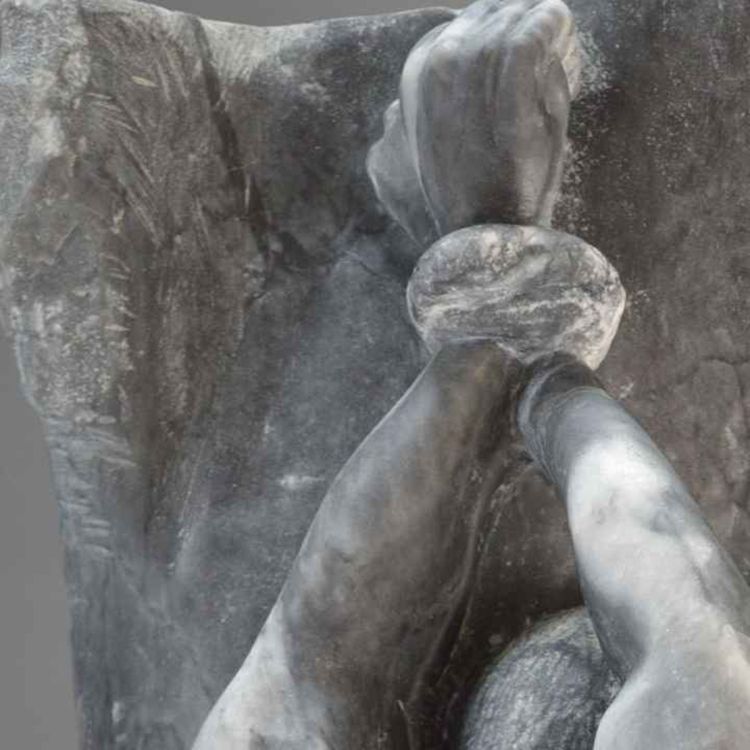Share

Transforming Society podcast
How can torture be tackled more effectively?
•
In this episode of the Transforming Society podcast, Jess Miles speaks with Malcolm Evans, former Chair of the UN Subcommittee on the Prevention of Torture and author of Tackling Torture: Prevention in Practice.
They discuss the traps we fall into when talking about torture, including the disturbing normalisation of torture in television and film, why the distinction between torture and inhuman treatment is a sensitive area and what could be done to help prevent torture more effectively.
Find out more about the book: https://bristoluniversitypress.co.uk/tackling-torture
Intro music:
Cold by yoitrax | @yoitrax
Music promoted by www.free-stock-music.com
Creative Commons Attribution 3.0 Unported License
More episodes
View all episodes

Why freedom movements fail
38:16|Why are liberation and independence movements so often betrayed when their leaders get into power? In this episode, Richard Kemp speaks with Lord Peter Hain, author of ‘Liberation and Corruption’, about this uncomfortable question. They discuss Peter’s involvement with the fight for Nelson Mandela’s freedom, the reasons why liberation movements from ANC to the Sandinistas have corrupted once in government, and what we can all do to combat corruption and stop this vicious cycle. Lord Peter Hain served as MP for Neath (1991-2015) and held senior roles in the UK Labour Government for 12 years, including seven in the Cabinet.Find out more about the book at: https://policy.bristoluniversitypress.co.uk/trade/liberation-and-corruptionThe transcript is available here: https://www.transformingsociety.co.uk/2026/01/19/podcast-why-freedom-movements-fail/Timestamps:01:37 - How are liberation movement who come into power affected by their predecessors?03:59 - Who were the Sandinistas? What did they want? And how did they go so wrong?07:27 - What role did the US play in the corruption of Nicaragua and quite a lot of Latin America?09:40 - How does the UK participate in theft from the African continent?18:06 - What is neoliberalism, and did it contribute to Robert Mugabe's descent into corruption?22:03 - Is there a link between neoliberalism and the rise of the far right and the populist right?26:13 - How correct was Mandela when he said that those who fought corruption could become corrupt themselves?29:26 - Could you tell us about your involvement with campaigning for Nelson Mandela's freedom?32:34 - What lessons should our governments and policymakers learn from liberators who come into power?Intro music:Cold by yoitrax | @yoitraxMusic promoted by www.free-stock-music.com Creative Commons Attribution 3.0 Unported Licensecreativecommons.org/licenses/by/3.0/deed.en_US
89 seconds to midnight: why we need to rethink nuclear weapons now
32:03|Each January, the Bulletin of the Atomic Scientists adjusts the hands of its Doomsday Clock to signal how close humanity stands to catastrophe. At the end of the Cold War, the clock was set at 17 minutes to midnight. Today, it is at just 89 seconds – its closest-ever setting. In this episode of the podcast, George Miller speaks to Patricia Shamai, Principal Lecturer in International Relations at the University of Portsmouth and author of What Are Nuclear Weapons For? They discuss why nuclear weapons have drifted from public consciousness since the 1990s, even as thousands of warheads remain in existence, major powers modernise their arsenals, and new technologies make the strategic picture yet more complex. The conversation also touches on Vladimir Putin’s nuclear posture during the war in Ukraine, the challenges posed by strategic ambiguity, and whether – despite all this – there are any grounds for cautious optimism.Patricia Shamai is Principal Lecturer in International Relations and Associate Head of School in the Faculty of Humanities and Social Sciences at the University of Portsmouth.Find out more about the book at: https://bristoluniversitypress.co.uk/trade/what-are-nuclear-weapons-forThe transcript is available here: https://www.transformingsociety.co.uk/2025/12/19/podcast-89-seconds-to-midnight-why-we-need-to-rethink-nuclear-weapons-now/Timestamps:02:33 - What prompted you to write the book?08:33 - Did reading testimonies of people who experienced the detonations in Japan in 1945 enhance your understanding or change your perception?14:01 - Why is the nuclear weapon picture always changing?23:41 - What is the current climate among nuclear powers more broadly?28:52 - Are there any signs of hope that we can begin to pull that second hand back from midnight?Intro music:Cold by yoitrax | @yoitraxMusic promoted by www.free-stock-music.com Creative Commons Attribution 3.0 Unported Licensecreativecommons.org/licenses/by/3.0/deed.en_US
Growing up and older at work
33:16|Whether we like to admit it or not, we’re all growing older. However, the experience of growing older at work remains surprisingly overlooked and under theorised in management and organisation studies.In this Transforming Business podcast, Martin Parker speaks with Kathleen Riach, author of ‘Working through Ageing’, about her groundbreaking 10-year longitudinal study that offers fresh theoretical and empirical insights into how ageing is experienced in the workplace.They discuss how this fascinating study grew from a conversation in a pub, the way ageing is both universal and unique, and the importance of providing, if not answers then, alternative paths when presenting research. Kathleen Riach is Professor of Organizational Studies at University of Glasgow and Visiting Professor at the Monash Centre for Health Research and Implementation at Monash University.Find out more about the book at: https://bristoluniversitypress.co.uk/working-through-ageingThe transcript is available here: https://www.transformingsociety.co.uk/2025/12/11/podcast-growing-up-and-older-at-work/Timestamps:00:33 - Why are you interested in ageing and work?03:03 - Do you think ageing at work is a more important topic than it used to be?08:14 - Can you talk about your study and how it came about?14:08 - Can you talk about how ageing is universal, but also unique?16:17 - What is the relationship between your work, Simone de Beauvoir and the idea of phenomenology?20:36 - Did this research make you think differently about your own ageing?23:13 - What effect does talking about bodies at work have on policies in organisations?27:55 - Is it difficult to move from critique into a place of action?30:29 - What are your plans next?Intro music:Cold by yoitrax | @yoitraxMusic promoted by www.free-stock-music.com Creative Commons Attribution 3.0 Unported Licensecreativecommons.org/licenses/by/3.0/deed.en_US
How true crime stories shape society
01:15:03|True crime is a huge cultural industry, yet behind its stories lies real victims and uncomfortable ethical implications.In this podcast, Richard Kemp speaks with Ian Cummins and Martin King, two of the authors of ‘True Crime: Key Themes and Perspectives’, about the impact true crime has on society.They discuss Serial, the groundbreaking podcast, and how it sparked the industry anew, the media’s reaction to the Lucy Letby case, and the wider issue of using crime stories to push sales and clicks.Ian Cummins is Senior Lecturer in the School of Health and Society at the University of Salford. Martin King is an independent scholar and author.Find out more about the book at: https://bristoluniversitypress.co.uk/true-crimeThe transcript is available here: https://www.transformingsociety.co.uk/2025/12/04/podcast-how-true-crime-stories-shape-society/Timestamps:00:01:55 - Why does true crime fascinate us?00:08:27 - What is the importance of 'In Cold Blood' by Truman Capote?00:11:14 - What effects does the interplay between fact and fiction in true crime have?00:19:10 - What is the relationship between the Central Park Five and true crime media?00:28:25 - What does the reverence of famous serial killers tell us about our culture's values?00:42:59 - What ethical issues do podcasts like Serial have?00:53:34 - What do cases like Sutcliffe tell us about our collective attitude towards violence against women?00:57:31 - What does the media coverage of the Lucy Letby case tell us about our media landscape?01:08:33 - Does our celebritisation of criminals pose issues, and how could we change things going forward?Intro music:Cold by yoitrax | @yoitraxMusic promoted by www.free-stock-music.com Creative Commons Attribution 3.0 Unported Licensecreativecommons.org/licenses/by/3.0/deed.en_US
‘Is there snow on Mount Everest?’ – why truth still matters
44:46|In this episode of the podcast, N.J. Enfield, professor of linguistics at the University of Sydney, joins George Miller to discuss 'What Is Truth For?' — a book that sees truth not as a battlefield but as a shared practice of collaboration, error correction and trust. Together they explore what it takes to keep words and reality aligned when confidence in institutions and expertise is low and misinformation rife.N. J. Enfield is professor of linguistics at the University of Sydney.Find out more about the book at: https://bristoluniversitypress.co.uk/trade/what-is-truth-forThe transcript is available here: https://www.transformingsociety.co.uk/2025/11/26/podcast-is-there-snow-on-mount-everest-why-truth-still-matters/Timestamps:01:33 - Has there been a shift in 'The Truth' over the last 20 or so years?05:59 - Can you tell us about the 'Fighting Truth Decay' project?09:03 - What does a linguist bring to a project like this that's different from other specialists?13:56 - Is the truth always going to be contingent and to some degree subjective? 28:58 - What do you make of the apparent loss of credibility accorded to institutions such as universities? 33:43 - What about people who have very different belief systems from our own?41:01 - How do you retain your optimism and what would you say to someone so that they don't themselves give up hope?Intro music:Cold by yoitrax | @yoitraxMusic promoted by www.free-stock-music.com Creative Commons Attribution 3.0 Unported Licensecreativecommons.org/licenses/by/3.0/deed.en_US
When HR hurts: Why workplace discipline needs a rethink
39:09|Have you ever been part of an HR investigation? Whether you were the subject, the investigator or simply an outside observer, there is growing evidence of the significant harm they can cause. In this episode of our Transforming Business podcast series with Martin Parker, Andrew Cooper and Adrian Neal, editors of ‘Under Investigation: Transforming Disciplinary Practice in the Workplace’, discuss the issues with these processes. They explore the impact employee investigations can have on organisational culture and show that prioritising employee wellbeing, alongside the application of these processes, is not only possible but essential.Andrew Cooper is the Head of Programmes for Employee Wellbeing in Aneurin Bevan University Health Board in NHS Wales. Adrian Neal is the Head of Employee Wellbeing in Aneurin Bevan University Health Board in NHS Wales and a Consultant Psychologist.Find out more about the book at: https://bristoluniversitypress.co.uk/professional-business/under-investigationThe transcript is available here: https://www.transformingsociety.co.uk/2025/11/11/podcast-when-hr-hurts-why-workplace-discipline-needs-a-rethink/Timestamps:1:23 - What is your book doing?2:30 - What potential harms are there, outside of the person going through the process?6:19 - What angles are you both approaching this issue from?8:17 - What stories stand out to you?13:19 - What should we be doing instead?17:12 - How does giving voice open these processes for investigation?24:59 - How does scale affect the application of these processes?31:21 - How do these findings apply on a broader scale?35:04 - Who would you like to read this book?Intro music:Cold by yoitrax | @yoitraxMusic promoted by www.free-stock-music.com Creative Commons Attribution 3.0 Unported Licensecreativecommons.org/licenses/by/3.0/deed.en_US
PODCAST: Are people really to blame for their debt?
56:42|When you think of people in debt, what do you imagine? Irresponsible people who leave telephones ringing and hide from debt collectors, or people faced with an impossible situation? In this episode, Richard Kemp speaks with Ryan Davey, author of ‘The Personal Life of Debt’, about the true, everyday lives of indebted people. They discuss the people Ryan met during his fieldwork on a southern English housing estate, the reality of living on the ‘never-never’, and what changes, to debt itself and society as a whole, are needed to break this vicious cycle.Find out more about the book at: https://bristoluniversitypress.co.uk/the-personal-life-of-debtThe transcript is available here: https://www.transformingsociety.co.uk/2025/10/24/podcast-are-people-really-to-blame-for-their-debt/Timestamps:1:55 – What was your experience of Woldham during your research?7:52 – Did you experience any class tension?10:07 – How can debt be worse now than during the 2008 financial crash?17:08 – What is ‘living on the never-never’ and what does it mean to different people?25:46 – Are these communities perfect prey for credit?32:19 – How does the rescue mindset of child protection manifest in a place like Woldham?38:35 – What affect did right to buy, and other similar policies, have on working class communities?44:34 – Why would debt advisors have negative views of debtors?51:03 – What changes are needed to break this unending cycle of debt?Intro music:Cold by yoitrax | @yoitraxMusic promoted by www.free-stock-music.com Creative Commons Attribution 3.0 Unported Licensecreativecommons.org/licenses/by/3.0/deed.en_US
How education is failing young working-class men
43:40|We often hear that working-class boys in education are misogynistic, aggressive and unwilling to learn. But how true is this? In this episode, Richard Kemp speaks with Alex Blower, author of ‘Lost Boys: How Education is Failing Young Working-Class Men’, about how the education system often fails these boys. They discuss the role of masculinity in the lives of working-class boys and men, Alex’s personal experiences with being working-class and a young carer, and why we need to stop focusing on perceived individual failures and instead turn our attention to the troubled relationship between these boys and the systems in which they reside.Listen to the episode to get 50% off the paperback and eBook until 20 October 2025.Alex Blower is Research Fellow at Arts University Bournemouth. Find out more about the book at: https://policy.bristoluniversitypress.co.uk/lost-boysThe transcript is available here: https://www.transformingsociety.co.uk/2025/10/03/podcast-how-education-is-failing-young-working-class-men/Timestamps:01:32 - Can you tell us about your upbringing and experiences of education?08:08 - What consequences have occurred from political leaders pointing to working-class boys themselves as the problem?11:43 - Does this have an effect on the recent polarisation and marches?14:02 - Did your feelings of aspiration change when you changed schools?17:22 - Should schools be providing more diverse avenues for future progression?20:42 - What is the working-class identity now?24:51 - What inequalities are there and how are they perpetuated even by people with first-hand experience?29:17 - Can you explain the caring roles that young working-class people have to take on, and how the education system is letting them down?35:56 - What did you learn from the Being a Boy project?39:11 - What is Boys’ Impact? And what changes do you hope to achieve from this work?Intro music:Cold by yoitrax | @yoitraxMusic promoted by www.free-stock-music.com Creative Commons Attribution 3.0 Unported Licensecreativecommons.org/licenses/by/3.0/deed.en_US
Drugs: The path that led to prohibition
45:05|The goal of drug policy is clear, according to the United Nations, whose convention on narcotic drugs largely sets the framework for what individual states do. The aim, the UN says, is to end the ‘serious evil’ of addiction. This, it adds, is to be achieved by preventing public access to dangerous substances, while at the same time ensuring adequate provision of narcotics to meet medical and scientific need. The challenge of these twin purposes – ensuring availability for medical use, preventing availability for recreational use –encapsulates the ‘dual use dilemma’ that has confronted drug policymakers for the past 150 years, as Julia Buxton, Professor of Justice at Liverpool John Moores University, explains in this episode of the podcast. Julia reflects on how personal experience drew her into the field, why US power has played such a disproportionate role and what happens when countries attempt reform. The conversation explores not only the human costs of criminalisation, but also why it has proved so hard to shift drug policy towards a different, health-led future.Julia Buxton is Professor of Justice at John Moores University in Liverpool and British Academy Global Professor. Find out more about the book at: https://bristoluniversitypress.co.uk/trade/what-is-drug-policy-forThe transcript is available here: https://www.transformingsociety.co.uk/2025/09/17/podcast-drugs-the-path-that-led-to-prohibition/Timestamps:2:19 - Tell me about the challenge of talking about drug policy to such different audiences5:26 - Can you tell us about the story of how you came to study drug policy?8:30 - Has the medicinal use of drugs improved in the past 25 years?12:36 - When do you think it's useful to start looking in the historical record for the first signs of what would become our current global policy towards restricting access to certain drugs?19:28 - What is path dependency in the context of evolving drug policy?22:05 - How influential is the US in this context?30:55 - Can you tell us about efforts to decriminalise some drugs in some countries?41:50 - Are there things that give you a little bit of hope for a better future?Intro music:Cold by yoitrax | @yoitraxMusic promoted by www.free-stock-music.com Creative Commons Attribution 3.0 Unported Licensecreativecommons.org/licenses/by/3.0/deed.en_US